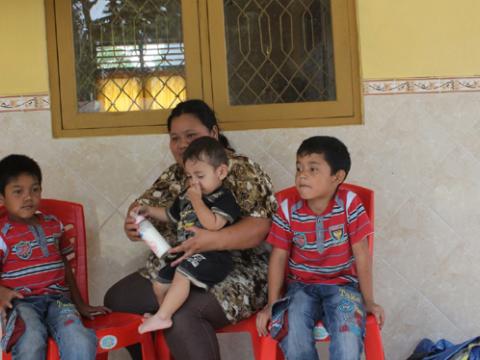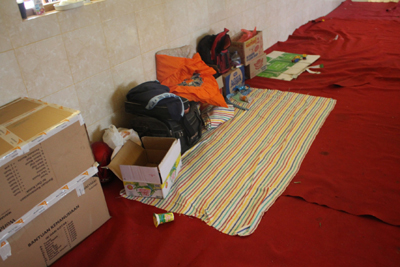Gravels Keep Falling on My Head

Kediri, Indonesia -- February 13th was an unusual Thursday for Sulton, nine year old. His father and mother were on full alert that day as Mount Kelud, some 10 km away from their house, has been so restless and much more furious all through the day.
At 8 PM (GMT+7), his family received an order to evacuate and they rushed to the closest evacuation center, an elementary school in Wates, Kediri, in East Java province. They were just there for a while when gravels poured heavily from the sky making frightening noises and darkened the night even more. Kelud erupted at 11 PM. All families who were already there ran as fast and as far as they can to find another shelter.
"I felt gravels fall on my head. They really hurt me, but thankfully they didn’t cause any serious injuries or scars.” said Sulton
“My family evacuated with a motor bike. Some of my friends evacuated with a truck. During this second evacuation, I felt gravels fall on my head. They really hurt me, but thankfully they didn’t cause any serious injuries or scars. My head did not bleed or bruised at all. It just hurt,” said Sulton recalling the night when he ran for his life.
On his third day at the evacuation center in Sumber Agung village near Kediri, Sulton didn’t complain of anything. He said that he only skipped school for a day on Friday and had been “enjoying” the weekend at the shelter by playing with volcanic ash, trying to find tiny crabs at the small canal nearby, and watching Sponge Bob together on a TV available at the shelter. Sulton’s family with many others are now sharing one big room and slept on the floor with flannel red carpet as their beds.
“I have a rainbow-colored blanket to sleep on – covering the red carpet. That is where I sleep now,” Sulton said casually as he pointed to a spot by the door.
The third grader is proud because he managed to safe his school books and will be able to finish his homework. He is still excited even though he doesn’t know about the school condition and when it will open again. Sulton is considered “lucky” since most of his new friends whom he met at the evacuation center weren’t able to bring their books.
Despa, eight year old, is one of the bookless kids. He was shocked and upset with the sudden eruption that changes his routine. The second child out of five siblings refused to eat for two days. This bothered his mother, Sundari (34).
“He just ate pecel (steamed vegetarian local dish) this morning after rejecting almost everything for two days. I have five boys with me in this temporary shelter. We didn’t save their school books because we were busy evacuating. Everything happened so fast. We only have a few minutes to run away before it (Kelud) erupted,” said Sundari as she’s holding her youngest son who is one year old.
Sundari’s husband and their oldest son were not around when World Vision Indonesia came to distribute a package for the families at the shelter. They went back to their houses to clean up the rooftops even though it is not suggested by the authority to do so for fear of fresh eruption.
“If we don’t clean up the roof, our house might collapse. When my husband is away, I couldn’t rest well because I need to take care of my other four sons. The youngest keep crying and I am so tired,” Sundari added with her red eyes indicating sleep deprivation.
Most people are doing the same thing as Sundari’s husband. They return to their houses during the day time to clean the roofs and feed their cattle. This is why most evacuation centers are less crowded at noon. The survivors will be back to the shelters before dark because they couldn’t sleep in the houses yet.
Volcanic ashes still cover the city of Kediri on Sunday and a lot of houses within 30 km radius from the crater were severely damaged. Gravels and ash didn’t just fall on Sulton’s head, they also fell on many houses -- making holes and even bringing down scores of roofs.
Text and photos by Shintya Kurniawan, World Vision Indonesia Communicator
